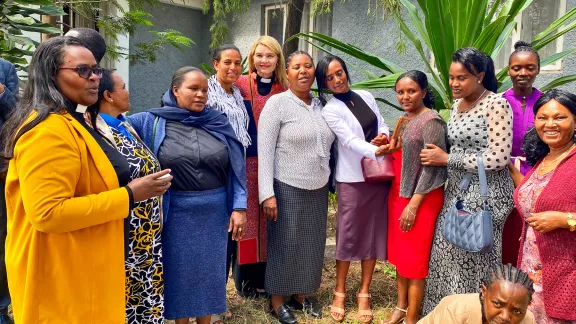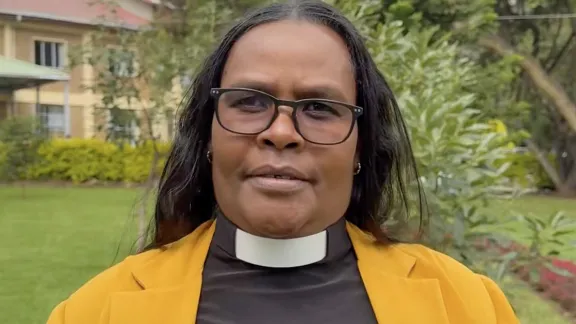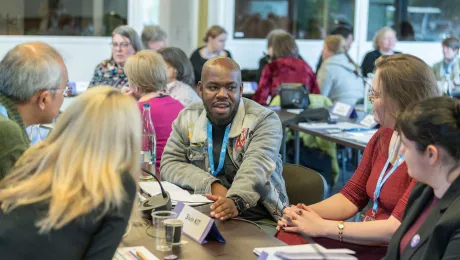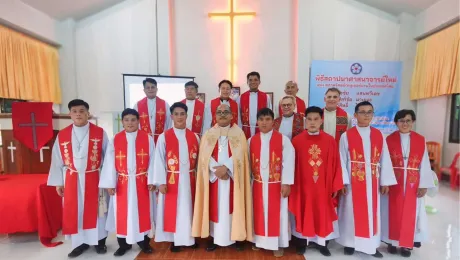In Ethiopia’s Lutheran church, the number of women studying theology and leadership is growing. A new gender justice training program at synod level aims to create more opportunities for women.

Some of the participants in the gender justice and leadership training in Hawasa, Ethiopia. Photo: LWF/K. Kiilunen
LWF and EECMY collaborate in training program for synods
(LWI) – A new leadership training program at synod level in the Ethiopian Evangelical Church Mekane Yesus (EECMY) seeks to promote more opportunities for women as leaders and increase awareness about gender justice.
The program was inaugurated in mid-February in partnership with The Lutheran World Federation (LWF). The first training took place in Hawasa, EECMY’s South Central Synod, and over 40 participants from 17 synods attended, including women leaders, synod presidents, general secretaries, and national church leaders. More trainings are planned to include the remaining 26 synods.
In Hawasa, several participants noted that while more women are studying theology and other courses at the Mekane Yesus Seminary in Addis Ababa and other church training institutions, there are few women in leadership positions. Many attributed this to cultural perceptions that portray leaders as predominantly male.
“Both male and female are created in the image of God. But our culture is different from that biblical point of view. We have to challenge that by teaching and creating awareness for the believers,” said Ms Meretech Masebo, director of the Women’s Ministry Department at the EECMY South Central Synod. She noted that other training programs through the church’s head office are also providing important lessons and opportunities to fight gender-based discrimination and cultural barriers.
Meaningful and full participation of women
LWF Program Executive for Capacity Building and Leadership Development Rev. Katariina Kiilunen, led the training with Rev. Tagesech Dagnew, EECMY national director of the Women's Ministry Department, and other staff.

Rev. Tagesech Dagnew, national director, EECMY Women's Ministry Department Photo: LWF/S. Kit
Dagnew thanked the LWF for this collaboration and underlined the church leaders' support in implementing the LWF Gender Justice Policy from the national level to the grass roots. “We need meaningful and full participation of women, with their power, their gifts, and their good ideas,” she added.
The women’s ministry leader highlighted EECMY President Rev. Dr Yigezu Dibisa’s message on women’s participation in the church’s holistic ministry. In his keynote address, Dibisa, who is also LWF Vice-President for Africa emphasized the church’s role “as an agent of change for gender justice in a society where cultural norms are very male-dominated.” He affirmed the importance of creating such awareness not only at the central church office, but also in congregations, communities and families.
We need meaningful and full participation of women, with their power, their gifts, and their good ideas
Rev. Tagesech Dagnew, national director, EECMY Women's Ministry Department.
Opportunities to lead together
“The Holy Spirit has given us—women and men—the gift to serve without any discrimination, including women’s ordination, but our traditional culture makes it possible to discriminate against women. This is why we have to be included in the work of God’s mission in the church,” noted Ms Sinkinesh Gercho, coordinator of the Women's Ministry Department in the South West Synod.
EECMY Wabe Batu Synod President Rev. Galetu Deko spoke of the opportunities for women and men to work together in evangelism and lead community development activities in the region that neighbors Somalia. “In this Muslim-dominated area, the number of people who believe in Christ has grown from year to year. The women’s ministry is important, because without women, the evangelism and sharing the gospel does not succeed,” he added.
Kiilunen said the first training was marked by “good and open conversations on strengthening the role of women in the church,” with participants agreeing to develop an action plan for each synod. The LWF Gender Justice Policy served as one of the reference documents.


